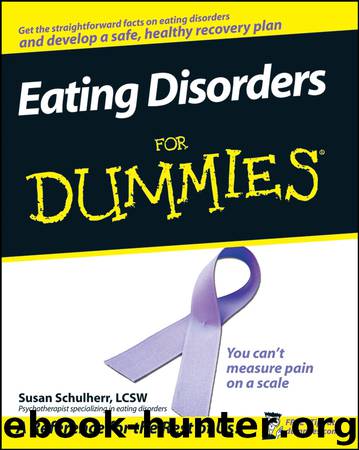Eating Disorders For Dummies by Susan Schulherr

Author:Susan Schulherr
Language: eng
Format: epub
Publisher: Wiley
When you are unable to bounce back from the effects of trauma with the help of family, friends, community, and time, you suffer from what’s called Post-Traumatic Stress Disorder (PTSD). If you have PTSD, it severely disrupts your life. Its symptoms can include nightmares, flashbacks, panic attacks, numbing, depression, irritability, body aches and pains, a sense of loss of meaning in life, and more. PTSD requires treatment. (You can read more about PTSD and its treatment in PTSD For Dummies by Mark Goulston [Wiley].)
All trauma is strikingly similar in some respects. However, experiencing a one-time traumatic event as a stable adult (for example, being the victim of a crime or a car accident, or losing someone unexpectedly) is very different from experiencing chronic trauma as a child. The most important difference is that an adult has many more resources to call on than a child. Adults have more internal psychological resources, such as judgment, perspective, and the ability to self-soothe, as well as external resources, such as family, friends, a stable work environment, and so forth.
Children have not developed these buffering resources. What’s more, in childhood, the caregiver who is supposed to provide the buffering is often the source of the trauma. The chronically traumatized child feels very deeply that she is a powerless person in an unsafe world where overwhelming experiences can and do happen on a regular basis.
If you experienced chronic trauma in your childhood, you are likely to have a symptom picture that includes the following:
PTSD: A pattern of symptoms that include both memories or sensations of the trauma and various kinds of shutting down to distance yourself from it.
Dissociation: An effect of trauma that leaves you less connected to yourself and to life. You can read more about dissociation in Chapter 5.
A persistent pattern of interacting with yourself and the world: This pattern may include impulsive behavior, difficulty tolerating emotions, problems getting along with or trusting others, and low self-esteem.
Download
This site does not store any files on its server. We only index and link to content provided by other sites. Please contact the content providers to delete copyright contents if any and email us, we'll remove relevant links or contents immediately.
Nutrition for Sport, Exercise, and Health by Spano Marie & Kruskall Laura & Thomas D. Travis(3784)
Nutrition for Sport, Exercise, and Health by Marie Spano & Laura Kruskall & D. Travis Thomas(3734)
The Sprouting Book by Ann Wigmore(3590)
Flavor Flours by Alice Medrich(2865)
Superfood Smoothie Bowls: Delicious, Satisfying, Protein-Packed Blends that Boost Energy and Burn Fat by Chace Daniella(2483)
Memory Rescue by Daniel G. Amen(2422)
Dirty Genes by Ben Lynch(2317)
The Bad Food Bible by Aaron Carroll(2275)
Genius Foods by Max Lugavere(2220)
The Poisoner's Handbook by Deborah Blum(2140)
Good Calories, Bad Calories by Gary Taubes(2111)
The Main Street Vegan Academy Cookbook by Victoria Moran(2089)
The I Quit Sugar Cookbook by Sarah Wilson(2041)
Core Performance Essentials by Mark Verstegen(2013)
Memory Rescue: Supercharge Your Brain, Reverse Memory Loss, and Remember What Matters Most by Amen Dr. Daniel G(1978)
Big Girls Do It Stronger by Jasinda Wilder(1963)
Android App Development by Franceschi Hervé J.;(1845)
Sugar Crush by Dr. Richard Jacoby(1800)
Dr. Colbert's Keto Zone Diet by Don Colbert(1653)
